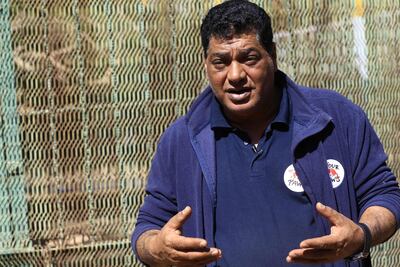Help has finally arrived for four starving lions in the Sudanese capital of Khartoum after images went viral online showing the emaciated big cats.
The predicament of the lions first came to local and international attention when a Khartoum software engineer, Osman Salih, visited Al Qureshi park and posted images of the starving cats.
"It's so upsetting. These lions have been suffering for so long," Mr Salih told AFP.
Subsequent images, including video clips, also posted online showed them walking with extreme difficulty with flies swarming over open wounds. All the lions had protruding bones.
The park is run by the Khartoum municipality and officials there said the animals were left to starve because of lack of resources. They added that the chaos and violence that swept the Sudanese capital during months of street protests that began in December 2018 against the 29-year rule of dictator Omar Al Bashir, who was removed by the military in April, contributed to the decline in their condition.
The images prompted many in Khartoum to rush to the rescue of the animals. An online campaign with the hashtag #SudanAnimalRescue produced generous donations of meat and medicine and drew attention to the unrelated danger faced by the African lion.
“Lots of fresh meat was brought by several donors as well as two sheep,” Mr Salih wrote on Facebook last week. “Supply of regular meat from factories and slaughterhouses was also secured.”
On Monday, a rapid response team of wildlife conservationists from the Vienna-based Four Paws flew into Khartoum to treat the animals, but it was too late for a lioness that died last week from dehydration and starvation even though local veterinaries tried to save her with intravenous fluids.
"It's now important to improve the conditions of the animals... and the next step is to find a long-term solution," Amir Khalil of Four Paws told AFP.

Mr Khalil said carrying out tests on the animals would not be easy. "It's very difficult to approach the animals and very risky," he said. Mr Khalil was quoted by The Associated Press on Tuesday as saying two of the four surviving lions were in "critical condition" having lost a third of their weight.
“Their muscles are not even able to move. I don’t know how we will be able to do injections,” he said.
"The animals are very weak at this moment, so moving them won't be the best thing," said Juno Van Zon, another member of the team.
"I think for now we have to focus on getting the animals healthy and also to train the people."
Sudan’s wildlife has greatly suffered from the country’s near-constant civil wars since independence in 1956, especially decades of conflict in southern Sudan. The fighting forced a significant number of animals to escape to neighbouring countries in search of safety.
The tragedy of the Khartoum lions, meanwhile, has come to world attention at a time when the African lion is thought by conservationists to be “vulnerable,” with an estimated 20,000 of them left in the entire continent. That figure underlines a staggering decline of 43 per cent in the period between 1994 and 2014, according to the International Union for Conservation of Nature.
Humans are not doing much better in Sudan, a vast Afro-Arab country that, beside civil wars, has suffered a series of famines since the 1980s. The United Nations says that of a population of some 43 million people, 9.3 million – 23 per cent of the population – will need humanitarian assistance in 2020.
Throughout Sudan, said the UN, 58 per cent of households cannot afford basic daily food basket and over 2.7 million children suffer from acute malnutrition.


